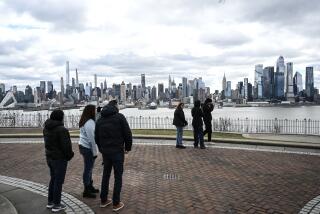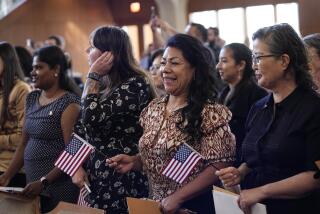No Fan Flare-Ups as Japan and North Korea Square Off at Soccer
The drama stayed on the field and out of the stands Wednesday night as Japan’s national soccer team scored in the final seconds to defeat rival North Korea, 2-1, in a contest played against a backdrop of high political tension between the two countries.
In front of 59,399 raucous fans in Japan’s Saitama Stadium, the game was a crucial encounter for two teams hoping to qualify for next year’s World Cup in Germany.
But the contest was also held as relations between the two countries sink deeper into acrimony over issues ranging from North Korea’s efforts to build nuclear arms to the fate of Japanese civilians kidnapped long ago by the totalitarian regime.
Officials had feared the political war of words could lead to trouble at the game. They deployed 3,400 police and private guards to keep order -- more than 20 times the normal size of a soccer security contingent.
The swell of Japanese fans wearing their team’s blue colors kept up a roar throughout the match, mostly drowning out chants from the 5,000 North Korea backers barricaded in a section at one end of the stadium.
There was some booing when the North Korean team took the field, and a few Japanese fans waved their country’s old imperial flag -- a taunt to the Koreans, whose peninsula was occupied by Japan from 1910 to 1945.
However, the North Korean national anthem finished to polite applause, and fans entered and left the stadium without violence.
“The game was played in a friendly atmosphere, and our players fought with the utmost effort, so we are pleased with that,” North Korean coach Yun Jong Su said after the loss.
The Asian neighbors have been locked in a caustic dispute since North Korea’s admission in 2002 that its agents had kidnapped 13 Japanese citizens during the Cold War, taking them back to the communist state in part to teach the Japanese language to spies.
The Japanese government is pressing for answers to what happened to at least eight of its citizens listed by the North as dead but by Tokyo as missing. Prime Minister Junichiro Koizumi is under pressure from the public to punish North Korea with economic sanctions until the abductees’ fate is known.
Pyongyang counters that all have been accounted for and that the matter is closed. In the days leading up to the soccer game, North Korea’s state-run media berated Japan for failing to apologize sufficiently for its brutal colonization of the Korean peninsula, and complained that Japan was ignoring its own blemished history of kidnapping tens of thousands of Koreans during World War II for use as sex slaves by Japanese troops and as forced laborers.
Barely a week goes by without one side verbally attacking the other, and the game heightened the sensitivities.
It was the first time the national teams had met since 1993, when the North lost to Japan and subsequently took a decade-long hiatus from international play.
North Korea’s mystique only grew in its absence, and its reemergence last year for this round of World Cup play prompted extraordinary media coverage in Japan.
But that probably won’t compare with the curiosity when North Korea opens its borders a crack in June and the Japanese fans and media travel to Pyongyang for the return match.
More to Read
Start your day right
Sign up for Essential California for news, features and recommendations from the L.A. Times and beyond in your inbox six days a week.
You may occasionally receive promotional content from the Los Angeles Times.






